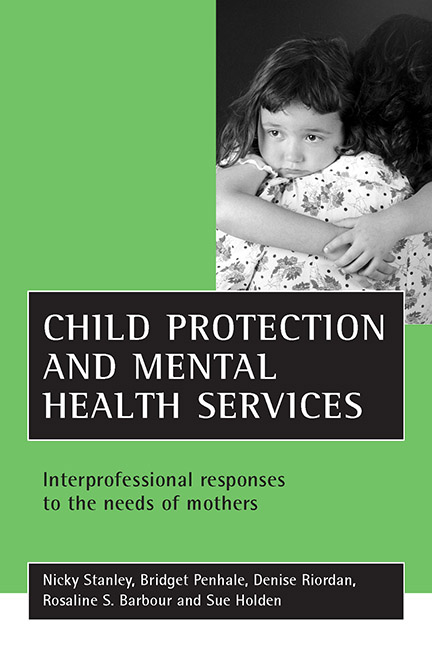Book contents
- Frontmatter
- Contents
- List of tables and figures
- Introduction
- one Mental health needs and mothering
- two The service context
- three Interprofessional work
- four The research study
- five Identifying key research issues
- six Mothers’ perspectives
- seven The mothers’ evaluations of professional support
- eight The professionals and their practice
- nine Conceptualising needs and evaluating risk
- ten Interprofessional communication and coordination
- eleven Identifying appropriate resources
- twelve Conclusion
- References
- Index
- Also available from The Policy Press
one - Mental health needs and mothering
Published online by Cambridge University Press: 20 January 2022
- Frontmatter
- Contents
- List of tables and figures
- Introduction
- one Mental health needs and mothering
- two The service context
- three Interprofessional work
- four The research study
- five Identifying key research issues
- six Mothers’ perspectives
- seven The mothers’ evaluations of professional support
- eight The professionals and their practice
- nine Conceptualising needs and evaluating risk
- ten Interprofessional communication and coordination
- eleven Identifying appropriate resources
- twelve Conclusion
- References
- Index
- Also available from The Policy Press
Summary
This chapter examines the ways in which the mental health needs of mothers are conceptualised within health and social care. Mothering is simultaneously identified as a prime site of origin for women's mental health problems and a key determinant of children's mental health. It is widely acknowledged that mothering is a stressful, demanding activity that offers many opportunities for failure and consequent loss of self-esteem. However, it is also defined as a cluster of psychological and practical skills which deliver nurturing and care to other family members. ‘Competent mothering’, difficult as it is to pin down, is construed in both popular and professional debates as the foundation of children’s mental health. While the successful exercise of parenting skills and the intimate relationships that mothers experience with their children can be a source of satisfaction and pride, in the context of mothers with mental health needs, research has tended to focus on adverse outcomes. Positive outcomes for parents with mental health problems and their children are rarely noted.
The dual representation of motherhood is supported by a wide range of popular media images of mothers (Coward, 1997). These include the ‘harassed mum’, the ‘dual-career mum’, the ‘stay-at-home mum’, the ‘feckless teenage mum’, the ‘glamorous Victoria Beckham mum’ and (an image popularised by Cherie Booth, the wife of the Prime Minister) the ‘juggling mum’. The juxtaposition of images and the diversity evident in these representations of motherhood reflect mothers’ subjective experience of ambivalence. Featherstone (1997) identifies this ambivalence as a key characteristic of modern mothering and suggests that, in the face of the conflict between the adult's need for autonomy and the child's need for dependence, some feminist theorists have ducked the question of how children's developmental needs are best met. Mental health and child care services have also been slow to identify the significance of this conflict for their clients, and it can be argued that services have made little progress in offering mothers solutions to the dilemmas that arise when their own mental health needs conflict with their children's needs for secure parenting.
The chapter explores the different theoretical models that have been developed to explain women's mental health needs. In particular, research that draws attention to social roles and life events, especially experience of abuse, will be discussed.
- Type
- Chapter
- Information
- Child Protection and Mental Health ServicesInterprofessional Responses to the Needs of Mothers, pp. 1 - 14Publisher: Bristol University PressPrint publication year: 2003



